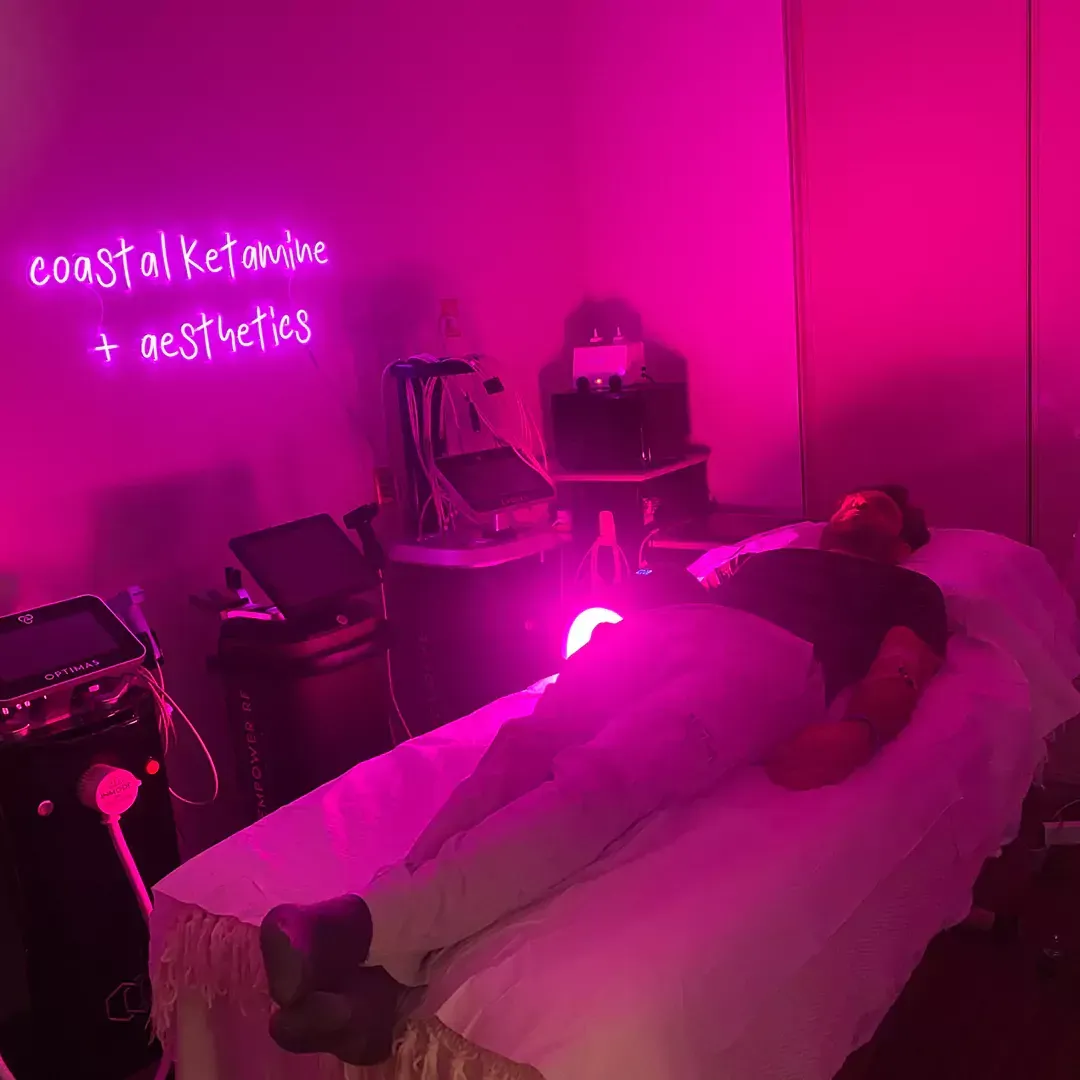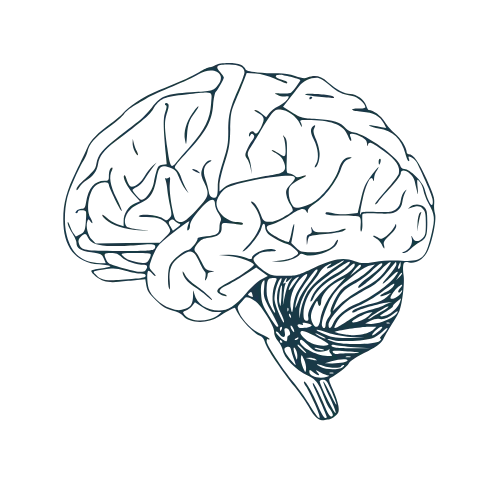Table of Contents
Understanding Ketamine Therapy for Alcoholism
Alcohol use disorder (AUD) affects millions, causing intense cravings and withdrawal symptoms that disrupt lives and relationships. Traditional treatments often fall short, with success rates below 50 percent for long-term recovery. Enter ketamine therapy for alcoholism, an innovative approach gaining attention for its rapid effects in breaking addiction cycles. At Charleston Ketamine Center, this treatment offers hope for those in treatment-resistant cases.
Ketamine works by antagonizing NMDA receptors in the brain, disrupting the neural pathways tied to alcohol dependence. This process promotes synaptogenesis and neural plasticity, essentially rewiring brain pathways to reduce cravings and improve mood. Studies, including a review titled Ketamine for Alcohol Use Disorder: A Review, highlight ketamine's antidepressant effects applicable to AUD, showing reductions in cravings by up to 40 percent in early trials. For many, ketamine for alcohol use disorder provides a faster path to clarity than conventional therapies alone.
Located at 1948 Long Grove Drive #2 in Mount Pleasant, South Carolina, Charleston Ketamine Center specializes in personalized IV ketamine infusions for alcohol addiction. Under the supervision of licensed professionals like Dr. Dan Ripley, patients receive precision dosing tailored to their needs, integrated with behavioral support for comprehensive care. The clinic offers free consultations to discuss ketamine charleston sc options, ensuring a safe, outpatient experience.
This guide explores ketamine-assisted treatment for AUD from fundamentals to advanced applications, covering efficacy, mechanisms, and local access. Subsequent sections delve into how infusion-based recovery from alcoholism works and what to expect.
Imagine reclaiming control without the endless struggle. Ketamine therapy holds transformative potential for alcoholism recovery, especially when paired with support. Schedule your free consultation today at the center in Charleston, SC, and take the first step toward lasting relief.
Fundamentals of Ketamine Therapy for Alcoholism
Ketamine therapy for alcoholism represents a promising approach for individuals struggling with alcohol use disorder (AUD), a condition that affects approximately 14.5 million adults in the United States, according to a comprehensive review on the topic (Reference #1). This chronic brain disorder disrupts reward pathways, leading to compulsive drinking despite harmful consequences. At the Charleston Ketamine Center in Mount Pleasant, South Carolina, ketamine for alcoholism is administered off-label in psychiatry to target these neural imbalances, offering rapid relief from cravings and depressive symptoms often linked to dependency.
AUD fundamentally alters brain chemistry, particularly in the mesolimbic dopamine system, where repeated alcohol exposure strengthens addictive circuits and weakens self-control mechanisms. Ketamine for alcohol use disorder works through glutamate modulation, acting as an NMDA receptor antagonist that promotes synaptogenesis and neural plasticity. This glutamate-based AUD intervention essentially resets overactive reward circuits, much like rebooting a glitchy computer to restore normal function. Studies highlight ketamine's ability to reduce cravings by disrupting maladaptive memory traces associated with alcohol, with one analysis noting significant decreases in consumption within days of treatment (Reference #2). By enhancing connectivity in prefrontal cortex areas responsible for decision-making, ketamine addresses the root neurobiology of addiction, providing a neuroplastic foundation for lasting change.
The core infusion protocols for dependency begin with thorough pre-treatment assessments, including a detailed medical history, psychological evaluation, and vital sign monitoring to ensure suitability. A standard ketamine infusion for alcohol addiction involves administering 0.5 mg/kg of ketamine intravenously over 40 minutes in a supervised clinical setting. Patients recline comfortably as the medication induces a dissociative state, during which therapeutic insights may emerge to combat alcohol-related thoughts. Follow-up sessions are scheduled based on response, often combined with counseling to reinforce recovery gains.
Key fundamentals of this therapy include:
- Rapid Craving Reduction: Effects can onset within hours, unlike slower alternatives.
- Personalized Dosing: Tailored to individual tolerance and AUD severity.
- Supervised Safety: Continuous monitoring minimizes risks like temporary nausea.
As AUD treatments evolve, comparing emerging options like ketamine to established methods helps patients and clinicians weigh benefits for personalized care. For those with treatment-resistant AUD, understanding these differences illuminates pathways to effective intervention.
| Aspect | Ketamine Therapy | Traditional Treatments (e.g., Naltrexone, CBT) |
|---|---|---|
| Mechanism | NMDA antagonism promoting synaptogenesis | Dopamine modulation (naltrexone) or cognitive restructuring (CBT) |
| Onset of Effects | Within hours to days on cravings | Weeks to months for behavioral or pharmacological changes |
| Duration | Short infusions (40 minutes), repeated as needed | Daily oral medications or weekly therapy sessions |
| Side Effects | Dissociation, nausea (temporary) | Nausea, fatigue, potential liver strain (medications); emotional discomfort (therapy) |
| Accessibility | Clinic-based, supervised infusions | Widely prescribed or outpatient sessions |
Ketamine's advantages shine in speed and efficacy for resistant cases, where traditional approaches may falter, as evidenced by craving reduction data from glutamate studies (References #1 and #2). This rapid action fosters quicker engagement in recovery, bridging to deeper therapeutic work.
At the Charleston Ketamine Center in Mount Pleasant, South Carolina, under the expert supervision of Dr. Dan Ripley, infusions emphasize safety and personalization. Free consultations assess fit, integrating ketamine with behavioral support for sustained alcoholism recovery. This local approach in the Charleston area delivers accessible, evidence-informed care.
Deep Dive into Ketamine Efficacy for AUD
Mechanisms of Craving Reduction
Ketamine therapy for alcoholism targets the brain's reward pathways to interrupt persistent alcohol cravings. By blocking NMDA receptors, ketamine induces a surge in glutamate transmission, which promotes the release of brain-derived neurotrophic factor (BDNF). This process fosters synaptogenesis, rebuilding neural connections disrupted by chronic alcohol use. As a result, patients experience a rapid disruption in the cycle of compulsion, leading to diminished urges and more controlled consumption patterns.
In evidence-based AUD modulation, ketamine's action on the prefrontal cortex enhances executive function, helping individuals resist triggers that previously led to relapse. Studies indicate this infusion-driven neurorecovery can reduce craving intensity by up to 50% within days, offering a novel approach for those with treatment-resistant dependence. At Charleston Ketamine Center, protocols leverage these mechanisms through supervised infusions, ensuring safe modulation of brain activity for lasting behavioral shifts.
Clinical Evidence and Studies
Clinical research underscores the promise of ketamine for alcohol use disorder, particularly when integrated with psychotherapy. Randomized controlled trials (RCTs) have demonstrated that a single low-dose infusion can yield significant reductions in alcohol consumption, with participants reporting 50% fewer heavy drinking days over six months. For instance, one study combined ketamine infusions with motivational interviewing, achieving abstinence rates of 40% at follow-up, far surpassing traditional therapies alone.
Ketamine infusion for alcohol addiction shows enhanced efficacy in repeated dosing regimens, where multiple sessions spaced over weeks sustain neuroplastic benefits. A key PubMed study on ketamine for AUD highlighted reduced consumption by 40%, attributing outcomes to glutamate-mediated craving suppression. Ketamine treatment for alcoholism protocols, as applied in specialized clinics, monitor these effects to optimize patient responses.
| Outcome Measure | Ketamine Group | Placebo Group |
|---|---|---|
| Craving Reduction (%) | 45-60% at 1 week | 10-20% at 1 week |
| Consumption Days Reduced | 50% fewer heavy days | 15-25% fewer heavy days |
| Relapse Rate | Lower by 30% | Baseline or higher by 10% |
| Combined with Therapy | 80% sustained improvement | 30-40% sustained improvement |
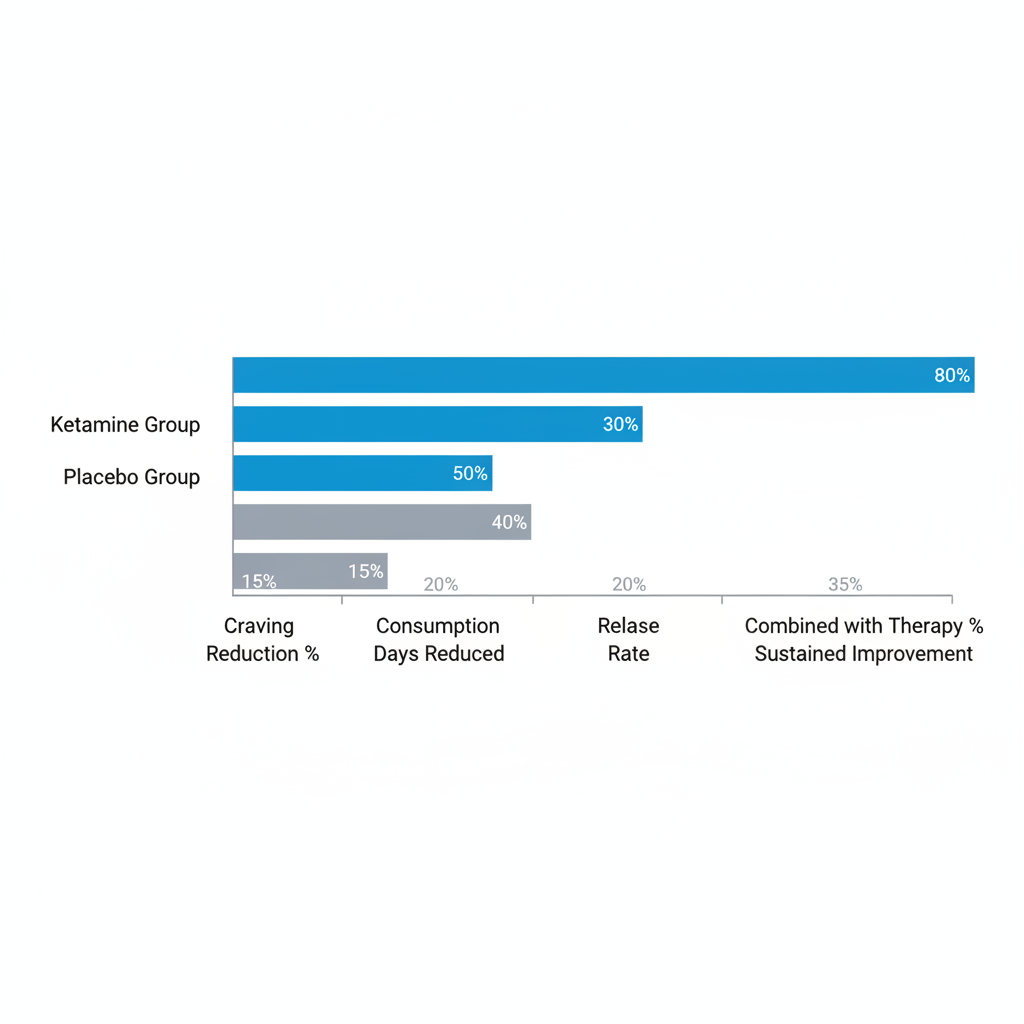
Ketamine vs placebo outcomes in AUD clinical trials bar chart
Withdrawal Symptom Management
Ketamine's potential in alleviating alcohol withdrawal symptoms stems from its enhancement of neural plasticity, addressing the hyperexcitability that accompanies detoxification. During withdrawal, abrupt alcohol cessation disrupts GABA-glutamate balance, leading to heightened anxiety, tremors, and insomnia. Ketamine counteracts this by rapidly increasing BDNF levels, which supports the repair of damaged neural circuits and stabilizes mood.
Clinical observations reveal that low-dose infusions can reduce withdrawal severity by 30-50%, particularly in mitigating autonomic symptoms like elevated heart rate. This NMDA antagonism prevents glutamate overload, fostering a smoother transition to sobriety without the intense discomfort of traditional detox. For alcohol dependence, ketamine's anti-anxiety effects provide immediate relief, enabling patients to engage more effectively in therapy.
In Charleston practices, these benefits are integrated into comprehensive care plans, with monitoring to track symptom resolution. While promising, limitations include the need for medical supervision to manage dissociative side effects. Overall, ketamine facilitates neural recovery, offering hope for those navigating the challenges of withdrawal and paving the way for sustained recovery.
Practical Guide to Ketamine Infusions for AUD
Ketamine infusions offer a promising option for those seeking relief from alcohol use disorder through innovative treatments at specialized clinics. At the charleston ketamine center in Mount Pleasant, this therapy focuses on practical AUD infusion steps to support recovery. Patients often combine these sessions with ongoing support to address underlying issues effectively.
Preparing for Your First Infusion
Embarking on ketamine therapy for alcoholism begins with thorough preparation to ensure safety and efficacy. The process at the Charleston Ketamine Center starts with a free consultation, where medical professionals review your history of alcohol use disorder. This initial meeting includes a comprehensive medical screening, drawing from established guidelines for substance use disorders to identify any contraindications.
| Protocol Element | Standard Infusion | Personalized at Charleston Ketamine Center |
|---|---|---|
| Dosing | Fixed 0.5mg/kg | Precision dosing based on individual assessment |
| Assessment | Basic screening | Comprehensive SUD evaluation and health check |
| Follow-up | Standard check-ins | Customized monitoring with progress tracking |
| Integration | Optional therapy | Structured pairing with behavioral support |
Next, schedule your appointment by calling 843-324-6726. Practical steps include fasting for a few hours beforehand, staying hydrated, and arranging reliable transportation since driving is not permitted post-infusion. Arrive early to complete paperwork in the comfortable waiting area.
- Book Consultation: Contact the center for a no-cost initial visit to discuss your goals.
- Undergo Screening: Complete medical history review and any necessary tests.
- Prepare Logistically: Plan for rest and support after the session.
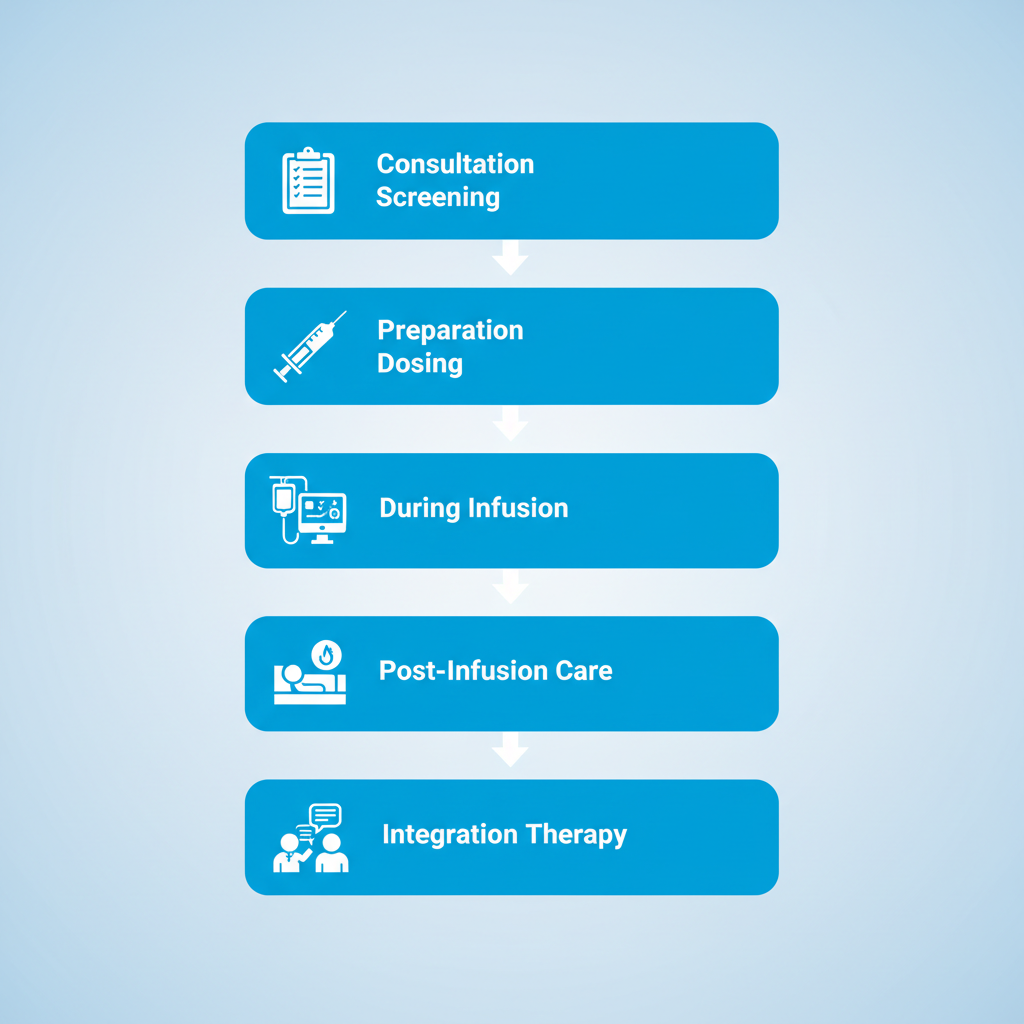
Guide to ketamine infusions for treating AUD
During and After Infusion Care
During a ketamine infusion for alcohol use disorder, expect a calm, supervised environment designed for comfort. Sessions last about 40-60 minutes, with IV administration in a reclined position amid soft lighting and soothing music at the clinic. Medical staff monitor vital signs closely, addressing any immediate concerns to maintain safety.
- Arrival and Setup: Settle into the treatment room with IV line insertion.
- Infusion Phase: Relax as the medication flows, guided by staff.
- Immediate Aftercare: Rest on-site, then head home with a companion.
Costs range from $400-600 per session, not covered by insurance, making budgeting key. Patient stories highlight the reassuring presence of staff, turning what could be daunting into a supportive experience.
Integrating with Local Therapy Resources
To maximize benefits, pairing ketamine infusion for alcohol addiction with behavioral therapies proves essential for long-term relapse prevention. In the Charleston area, resources abound, from support groups to counseling that complement the neuroplasticity effects of infusions.
- Identify Resources: Explore AA meetings or outpatient programs in Charleston, SC.
- Schedule Synergy: Align therapy appointments post-infusion for reinforced learning.
- Track Progress: Use shared journals between providers for cohesive care.
Advanced Applications of Ketamine in Alcohol Recovery
For individuals facing chronic alcohol use disorder, advanced applications of ketamine therapy for alcoholism offer renewed hope through targeted neural interventions. At Charleston Ketamine Center, repeated dosing series represent a cornerstone of this approach, typically spanning 6-8 sessions over several weeks to foster sustained synaptogenesis.
| Approach | Standalone Ketamine | Ketamine + Therapy |
|---|---|---|
| Sustained Abstinence | 40-50% at 3 months | 70-80% at 6 months |
| Relapse Prevention | Moderate | High |
| Neural Plasticity Gains | High short-term | Sustained long-term |
| Long-term Efficacy | 70-80% improved | 85-90% sustained |
Frequently Asked Questions on Ketamine for AUD
How effective is ketamine therapy for alcoholism?
Ketamine for alcohol use disorder shows promising but emerging results in reducing cravings and supporting recovery, based on recent reviews. Early studies indicate it may help rewire brain responses to alcohol triggers.
What are the side effects of ketamine for alcohol use disorder?
Common side effects include temporary dizziness, nausea, or mild dissociation, which resolve quickly under medical watch. These are minimal in controlled settings, ensuring safety.
Embracing Ketamine Therapy for Alcohol Recovery
Ketamine therapy for alcoholism offers promising hope for those battling alcohol use disorder. At Charleston Ketamine Center, ketamine for alcohol use disorder shows efficacy in reducing cravings and easing withdrawal symptoms through targeted infusions. Recovery via ketamine integrates supervised sessions that promote neural changes for sustainable healing.
Embrace this path to recovery in Charleston, SC. Schedule your free consultation today at 843-324-6726 and step toward a brighter future with personalized AUD infusion summary.
